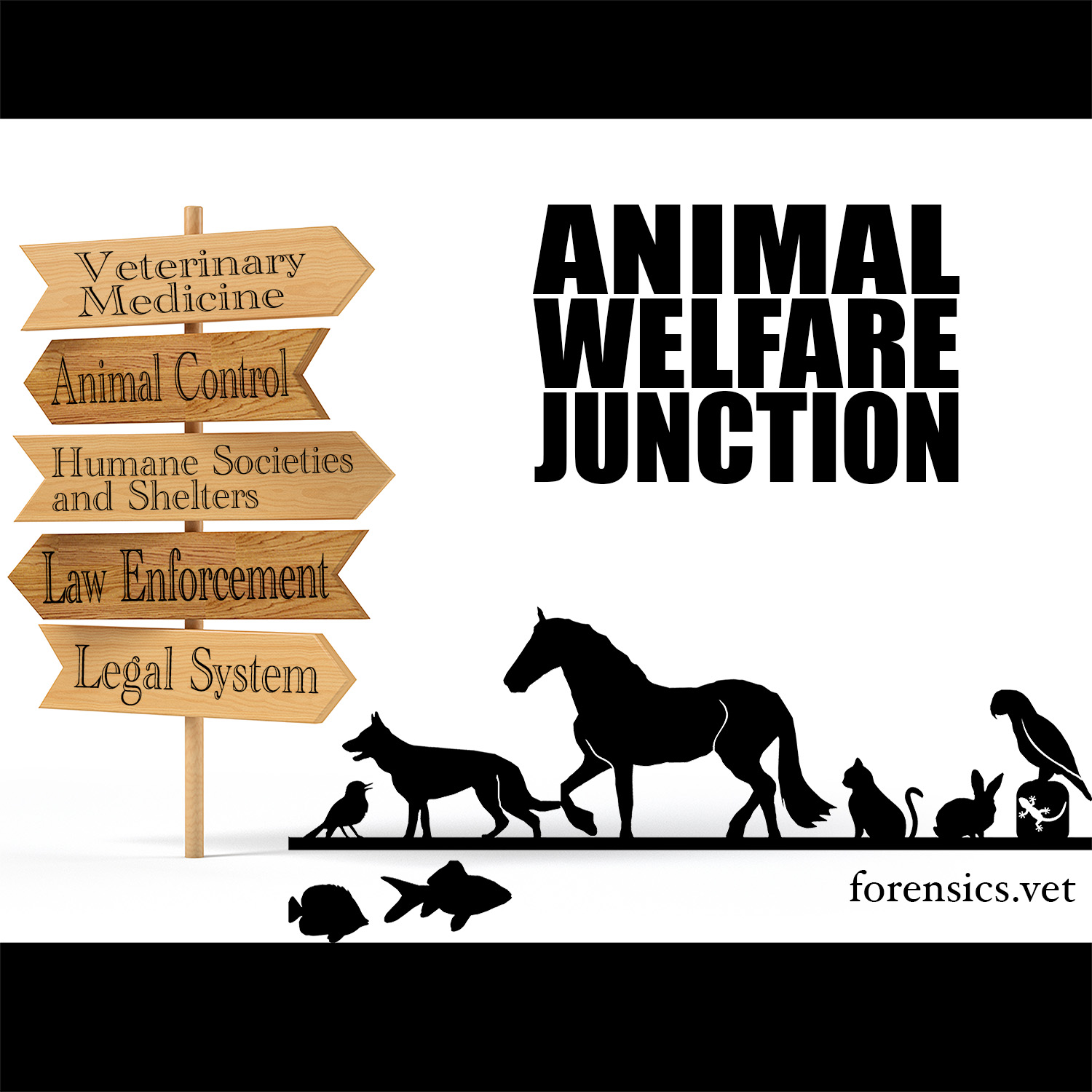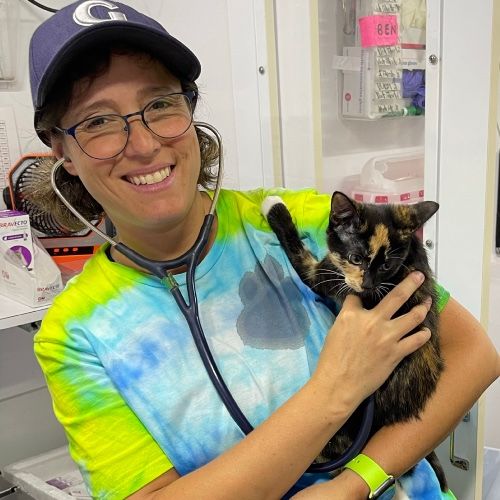Animal ForensiCon 2025: Jury Selection and Expert Testimony with Laura Hope
Laura Hope, Assistant State Attorney for the 5th Circuit, shares information on jury selection and expert witness testimony in jury trials.
The 2025 Animal ForensiCon: The Animal Forensic Investigations Conference is a three-day event, offered in Daytona Beach Shores, Florida from May 7th to 9th, 2025. The conference is hosted by the University of Florida’s Veterinary Forensic Sciences Laboratory.
ForensiCon offers workshops and educational sessions on a wide variety of topics pertaining to criminal investigations, law, small animal investigations, equine and livestock investigations, and wildlife crimes. This conference is open to anyone interested in animal forensic investigations. Attendees will also have the opportunity to network with faculty, experts, and investigators
Transcript
The first lecture this morning was on jury selection, and here to
2
:talk to us about it is Laura Hope.
3
:Thank you so much for being here.
4
:Laura Hope: Thank you for having me.
5
:Good morning.
6
:DrG: Can you tell us about
yourself, where you work and what
7
:brought you to this line of work?
8
:Laura Hope: Sure.
9
:I am an assistant state
attorney for the Fifth Circuit.
10
:In other words, I'm a prosecutor.
11
:And I, I came to the job because
while I was in law school, I was in
12
:mock trial, which means I tried cases
that were fake and I loved it, and
13
:I loved the courtroom, so I got a
job and here I am a few years later.
14
:DrG: Your talk was about jury selection,
which is really, really important.
15
:And you were talking about different
tips and tricks as far as doing it.
16
:So I guess overall, what
do you look for in a jury?
17
:Laura Hope: Sure.
18
:What I look for in a jury
is for them to be impartial.
19
:Depending on my case, can they set
aside their biases and render a
20
:verdict just based on the evidence?
21
:So, for example, if I have, you
know, an animal cruelty case, right?
22
:And uh, particularly I have a person
who's very sensitive to animal abuse,
23
:I may not want that person on the jury
because they wouldn't be ideal for it.
24
:They might be partial to
me, and that's not fair.
25
:You know, likewise, if you've got a
person that doesn't care much about
26
:animal abuse that they don't think
that should be regulated by law,
27
:I do not want that person on the jury
because they wouldn't, they might
28
:have a problem following the law.
29
:DrG: I took an animal law class and one
of the things that they were talking about
30
:is that sometimes jurors that are very
pro animal welfare may not be the ones
31
:that are great for animal welfare, not
only because they may be biased against
32
:the the person, but if you have somebody
like a hoarder or somebody that had
33
:good intentions but did something really
bad, then that person may potentially
34
:identify with them and then, you know,
35
:backfire.
36
:Laura Hope: Yeah.
37
:Right.
38
:No, I, I mean, that's true.
39
:It's such, it's so complex because
you truly have to listen to what
40
:they're saying and you're almost
gonna have to take a guess.
41
:Is this person going to
be good for my jury panel?
42
:Are they gonna be able to just look at
the facts and, and render a verdict?
43
:It's, it's kind of, it's kind
of a guessing game that you
44
:practice at to get better.
45
:DrG: And you talked about bias
and a lot of people say, well, I'm
46
:not biased, but we are all biased.
47
:I mean, yeah, like,
that's the reality of it.
48
:But it's a matter of kind of like
what, where your biases lie, right?
49
:Laura Hope: Yeah.
50
:It's a matter of, like you said,
we all have biases, but it's a
51
:matter of can you set it aside?
52
:Right.
53
:Some are, some of our biases are so
deep within us that we just can't.
54
:You know, particularly in domestic
abuse cases, if you were a victim of
55
:domestic abuse for years, for example,
as much as you wanna try to be impartial,
56
:you really may not be able to because
as you're listening to these facts,
57
:you're identifying, you know, and so
58
:no, you would strike that person.
59
:DrG: Yeah.
60
:So going towards the expert witness
side of it, how they conduct
61
:themselves can have an impact
on the jurors, is that right?
62
:Laura Hope: Oh, absolutely.
63
:Um, like I said in there, when, when I'm
talking to an expert, we're, we're kind
64
:of putting on a show for the jury and not
in a show, a as as far as like somewhat
65
:entertainment, but a show as we are
trying to condense hours of preparation,
66
:complicated material.
67
:And we're trying to condense
that in an hour, maybe an
68
:hour and a half presentation.
69
:And not only that, we're trying to
engage the jury and we're trying
70
:to make it as simple as possible.
71
:So, you know, a couple of tips for
expert witnesses is if, if, for example,
72
:you've got a canned answer that you
like, what is forensic pathology, for
73
:example, when you're giving that answer,
I would say be mindful, slow down.
74
:Emphasize in places that you might
want to emphasize, because I've seen it
75
:before in court where they just, they
just say their entire answer because
76
:they've memorized it and they move on.
77
:So remember that you are speaking to
a jury and you're trying to engage
78
:with everything that you're saying.
79
:Um, so that would be one of my tips.
80
:Watch for canned answers.
81
:Another one would be, as you are giving
your testimony, look at their faces.
82
:How engaged are they?
83
:Are they interested?
84
:Are you losing them?
85
:Are they, do they show confusion?
86
:Do we have to go back and explain that?
87
:Another tip that I did in there is, um,
you know, speak to me as the prosecutor
88
:in the same tone, same manner as you
would speak to the defense attorney.
89
:'cause at the end of the
day, you know what you know.
90
:The defense attorney like me, they're
trying to learn this particular area
91
:of law in the few hours that we had to
prepare, but you know, the ins and out.
92
:So when they're asking you a
question and that question is wrong.
93
:Answer it with facts and answer
it with education as opposed to,
94
:you know, showing that you didn't
like the question, for example.
95
:DrG: Yeah.
96
:I think that that, that plays a
lot in gaining credibility and
97
:Laura Hope: Oh, yeah.
98
:DrG: Like if the jury doesn't like you,
they may not believe what you have to say.
99
:Laura Hope: Right.
100
:DrG: Right.
101
:Laura Hope: Or if the jury thinks
you're biased about something,
102
:they just may tune you out.
103
:DrG: Yeah.
104
:And another thing that I have learned
is, you know, as veterinarians
105
:we're taught all these big words
and then you show up and then you
106
:wanna give all these big words.
107
:Laura Hope: Thank you.
108
:DrG: And you sound almost like,
like you're trying to show that
109
:you're smarter than everybody else.
110
:And realistically, you wanna make
it like lay person, and it's okay to
111
:use a big word, but then explain it.
112
:And not explain it in like,
well, let me tell you what
113
:this means because you're dumb.
114
:Right?
115
:Like, right.
116
:Let me explain what this means.
117
:You know, this is what we call
it, but this is what it means.
118
:Laura Hope: Yes.
119
:You know, I, I think that when you're an
expert witness, you're almost a teacher.
120
:Well, actually you are a teacher
because if you take the role of I know
121
:everything, and I'm trying to tell you
guys what is right, or you know how it's
122
:done, the jury's not gonna like you.
123
:They may not even believe you.
124
:What you want is you want to engage with
them, and I always say that if you truly
125
:know your subject, you can simplify it.
126
:If you can't simplify the subject,
you may not know it as well as you
127
:think you know it kind of thing.
128
:DrG: Yeah.
129
:Yeah.
130
:That makes perfect sense.
131
:And it's like, I feel that a lot of
veterinarians are afraid to get on
132
:the stand and then not know an answer.
133
:And it is okay to just say,
134
:Laura Hope: I don't know.
135
:DrG: I don't know.
136
:Laura Hope: Yeah.
137
:DrG: I don't know the
answer to this question.
138
:Laura Hope: Yeah.
139
:DrG: So, you know, it's like, don't,
don't embellish, don't try to make stuff
140
:up because that's how you get in trouble.
141
:Laura Hope: Yep.
142
:And I always say, I always tell 'em,
listen, you're just there to talk about
143
:what you know, what you've reviewed.
144
:You're not there to win the case for me.
145
:You're not there to argue for me.
146
:And, and that actually, you know, brings
me to a point when you're an expert
147
:witness, know exactly what you reviewed.
148
:Have a list?
149
:You know, did you watch the body cameras?
150
:Um, did you read the incident report?
151
:Did you listen to the 911 phone call?
152
:what medical records did you review?
153
:Because what if you are not completely
sure by, with details what you reviewed?
154
:What if the defense attorney has
a, you know, a piece of evidence
155
:like, oh, so you didn't see this?
156
:You know, and even though that piece of
evidence may not ultimately change your
157
:opinion, the jury may think it should.
158
:DrG: Right?
159
:Yeah.
160
:They may think that you're not prepared,
that you already had made your mind and
161
:it doesn't matter what else is there, that
you, you've already made your decision.
162
:And that's one of the things, I mean,
that's the other thing is when I'm going
163
:into a case, obviously I'm on the side
of the animals, the animal welfare,
164
:but you cannot sound like you're being
hateful, like for the other person.
165
:Everything is objective, right?
166
:Everything is about.
167
:This is why I am making my
decision, not because I don't like
168
:this person as a human being, but
because of the facts of this case.
169
:Laura Hope: Absolutely.
170
:And honestly, if you are testifying for
the state, you almost have the luxury
171
:that your objective opinion and your
subjective opinion are kind of the same.
172
:DrG: Yeah.
173
:Well, uh, thank you so
much for being here.
174
:It was a great lecture and I think
that a lot of people are going to
175
:learn, you know, some tips about
the importance of the jurors and how
176
:to handle themselves in, in court.
177
:Laura Hope: Thank you
so much for having me.

